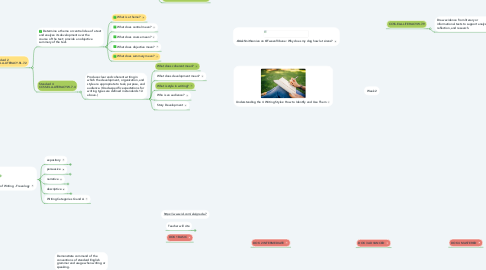
1. Story Development
2. NEARPOD
3. Edit word art - WordArt.com
4. GAMIFY YOUR CLASS
5. 7th grade reading passages
6. Randomizer
7. CCSS.ELA-LITERACY.RL.7.10
7.1. By the end of the year, read and comprehend literature, including stories, dramas, and poems, in the grades 6-8 text complexity band proficiently, with scaffolding as needed at the high end of the range.
7.1.1. What does comprehend mean
7.1.2. What does proficient mean
7.2. CCSS.ELA-LITERACY.W.7.8
7.2.1. Gather relevant information from multiple print and digital sources, using search terms effectively; assess the credibility and accuracy of each source; and quote or paraphrase the data and conclusions of others while avoiding plagiarism and following a standard format for citation.
7.2.1.1. What does credibility mean
7.2.1.2. what does accuracy mean
7.2.1.3. What does quote mean
7.2.1.4. What does paraphrase mean
7.2.1.5. What is plagiarism
7.2.1.6. What is an argument
7.2.1.7. claim
7.2.1.8. What is a counterclaim
7.2.1.9. Persuasive Writing Prompts
7.2.1.10. Bias
7.2.1.10.1. PORTRAIT
7.2.1.10.2. GLASS
7.2.1.11. LOGIC APPEAL
7.2.1.11.1. ETHOS APPEAL
7.2.1.11.2. PATHOS APPEAL
7.2.1.11.3. LOGOS APPEAL
8. Teacher will cite
8.1. Students will cite
8.1.1. Teacher gives example of an inference
8.1.1.1. Student will give an example of an inference
8.1.1.1.1. Teacher give example of critiquing the story.
9. Standard 1 CCSS.ELA-LITERACY.RL.7.1
9.1. Cite several pieces of textual evidence to support analysis of what the text says explicitly as well as inferences drawn from the text.
9.1.1. What does it mean to cite?
9.1.2. What does textual mean?
9.1.3. What does evidence mean?
9.1.4. What does support mean?
9.1.5. What does analysis mean?
9.1.6. What does explicitly mean?
9.1.7. What does inference mean?
9.2. Standard 3 CCSS.ELA-LITERACY.W.7.2
9.2.1. Write informative/explanatory texts to examine a topic and convey ideas, concepts, and information through the selection, organization, and analysis of relevant content.
9.2.1.1. What does informative mean?
9.2.1.2. What does explanatory mean?
9.2.1.3. What does examine mean?
9.2.1.4. What is a topic?
9.2.1.5. what is a concept?
9.2.1.6. What does relevant mean?
10. Standard 2 CCSS.ELA-LITERACY.RL.7.2
10.1. Determine a theme or central idea of a text and analyze its development over the course of the text; provide an objective summary of the text.
10.1.1. What is a theme?
10.1.2. What does central mean?
10.1.3. What does course mean?
10.1.4. What does objective mean?
10.1.5. What does summary mean?
10.2. Standard 4 CCSS.ELA-LITERACY.W.7.4
10.2.1. Produce clear and coherent writing in which the development, organization, and style are appropriate to task, purpose, and audience. (Grade-specific expectations for writing types are defined in standards 1-3 above.)
10.2.1.1. What does coherent mean?
10.2.1.2. What does development mean?
10.2.1.3. What is style in writing?
10.2.1.4. Who is an audience?
10.2.1.5. Story Development
11. DOK 1 BASIC
12. DOK 2 INTERMEDIATE
13. DOK 3 ADVANCED
14. DOK 4 MASTERED
15. Wow do you mummify a body? @AskSmithsonian
16. Would you eat soup made from crickets?
17. .@AskSmithsonian on @TweenTribune: Why does my dog howl at sirens?
18. Understanding the 4 Writing Styles: How to Identify and Use Them
19. week 1
20. 4 Types of Writing - Freeology
20.1. expository
20.1.1. audio
20.1.2. visual
20.1.3. written
20.2. persuasive
20.2.1. audio
20.2.2. visual
20.2.3. written
20.3. narrative
20.3.1. audio
20.3.2. visual
20.3.3. written
20.4. descriptive
20.4.1. audio
20.4.2. visual
20.4.3. written
20.5. Writing Categories Q and A
21. CCSS.ELA-LITERACY.RL.7.5
21.1. Analyze how a drama's or poem's form or structure (e.g., soliloquy, sonnet) contributes to its meaning
21.1.1. What is metre in a poem?
21.1.2. What is a literary drama
21.1.3. What is a poem
21.1.4. What is poem form
21.1.4.1. How many poem forms are there?
21.1.5. What is poem structure
21.1.5.1. Internal and external structure
21.1.6. What is a couplet
21.1.6.1. More on couplets
21.1.7. Poem writing prompt
21.1.7.1. Student options
21.1.8. Simple short poems
21.1.9. characterization
22. CCSS.ELA-LITERACY.W.7.9
22.1. Draw evidence from literary or informational texts to support analysis, reflection, and research.
22.1.1. Research paper
22.1.2. textual evidence
22.1.3. cite
22.1.4. Outline
22.1.5. Author's purpose vs. thesis
22.1.6. ONLINE RESEARCH JOURNALS
23. Week 2
24. https://www.ixl.com/ela/grade-7
25. CCSS.ELA-LITERACY.L.7.1
25.1. Demonstrate command of the conventions of standard English grammar and usage when writing or speaking.
25.2. CCSS.ELA-LITERACY.W.7.8
25.2.1. Gather relevant information from multiple print and digital sources, using search terms effectively; assess the credibility and accuracy of each source; and quote or paraphrase the data and conclusions of others while avoiding plagiarism and following a standard format for citation.
25.2.1.1. What does relevant mean?
25.2.1.2. What does credibility mean
25.2.1.3. what does accuracy mean
25.2.1.4. What does it mean to quote
25.2.1.5. What does paraphrase mean
25.2.1.6. What is plagiarism
25.2.1.7. Inference
25.2.1.8. Story Development
26. CCSS.ELA-LITERACY.L.7.2
26.1. Demonstrate command of the conventions of standard English capitalization, punctuation, and spelling when writing.
26.2. CCSS.ELA-LITERACY.W.7.9
26.2.1. Draw evidence from literary or informational texts to support analysis, reflection, and research.
26.2.1.1. Evidence
26.2.1.2. Support
27. week 3
28. CCSS.ELA-LITERACY.L.7.3
28.1. Use knowledge of language and its conventions when writing, speaking, reading, or listening.
28.2. CCSS.ELA-LITERACY.W.7.10
28.2.1. Write routinely over extended time frames (time for research, reflection, and revision) and shorter time frames (a single sitting or a day or two) for a range of discipline-specific tasks, purposes, and audiences.
29. CCSS.ELA-LITERACY.L.7.4
29.1. Determine or clarify the meaning of unknown and multiple-meaning words and phrases based on grade 7 reading and content, choosing flexibly from a range of strategies.
29.2. CCSS.ELA-LITERACY.W.7.2
29.2.1. Write informative/explanatory texts to examine a topic and convey ideas, concepts, and information through the selection, organization, and analysis of relevant content.

